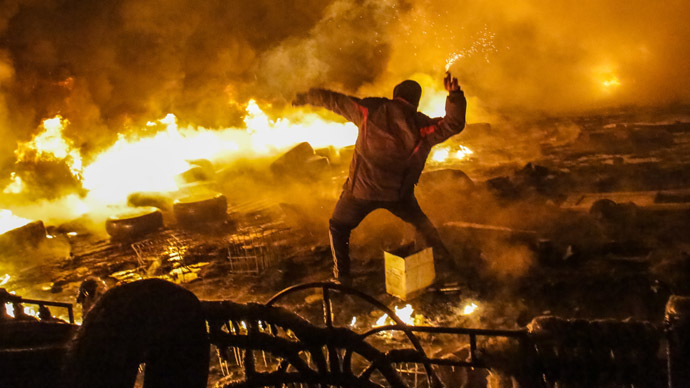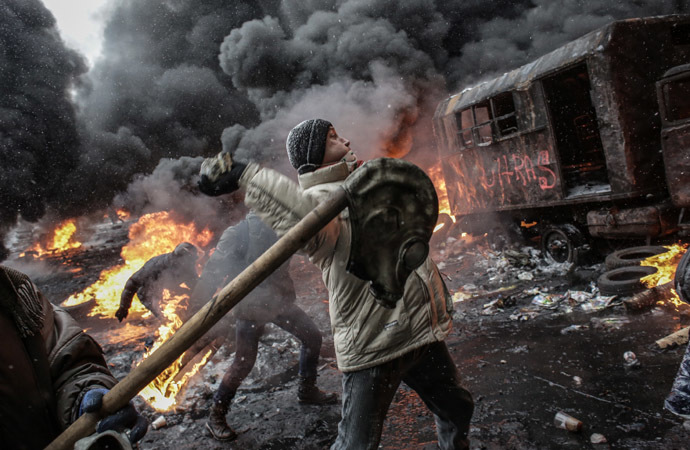Ukrainian opposition 'doesn't want to be seen co-opted by government'

One of Ukraine’s main opposition leaders, Arseny Yatsenyuk, would not accept President Yanukovich’s offer to become PM as he is afraid to damage the opposition's reputation, Alisa Lockwood, the head of Europe and CIS analysis at IHS Country Risk, told RT.
RT:The prime minister and the cabinet are gone, and most of the anti-protest laws too. Will that appease the opposition?
Alisa Lockwood: It is not sufficient to appease the entire opposition and this is one of the major challenges that Ukraine is facing right now. Clearly Yatsenyuk continues to call for the resignation of Yanukovich himself and turned down the initial offer to take up the prime minister’s position.
RT:The opposition refused to take the prime minister's post. Why turn down such an opportunity to get more influence over the politics of Ukraine?
AL: I believe there are several reasons for this. First of all and perhaps most important, the opposition can’t be seen as being co-opted by the Yanukovich administration, as this would significantly damage its reputation. Also, currently the opposition has quite a lot of momentum in the regions. We've seen certain regional administrations falling to the opposition and it’s likely they want to capitalize on the momentum that it has.
RT:The more radical wing of the opposition may well turn down any compromise. Will the moderates try to rein them in or simply go along and keep up the protests?
AL: Unfortunately, it doesn't seem like the opposition is efficiently coordinated for that to happen. The radical wing of the opposition, which has been largely involved in some of the violent incidents that we've seen, is likely to continue as long as it feels that it has an advantage over Yanukovich.
RT:If a compromise is reached in Kiev, what happens to the groups of protesters rioting and taking over government buildings in other cities all across Ukraine?
AL: It depends on the nature of the compromise. If the compromise is satisfactory to all parts of the opposition, which is unlikely, then we may well see the protesters in other parts of Ukraine stopping their protests and going home. However, it really looks like it has a lot of momentum behind it at the moment.

RT:Do you believe the opposition will be able to achieve early elections?
AL: This is obviously one of their key demands at the moment. And indeed with the resignation of the government that Yanukovich has accepted, the possibility of early elections is closer now than it was. However, it would still require agreement from Yanukovich to meet that demand. And we haven’t seen him moving in that direction yet.
RT:Why are they pushing so eagerly for early elections, and don’t just wait until February 2015 for the scheduled elections?
AL: It’s too late for that at this point. The cat is out of the bag and people are eager to see dramatic changes in Ukraine and would like to have a change of power as well, reflecting their desire to address some of the key problems that have been perceived as plaguing the Yanukovich administration.
RT:The EU’s top diplomat, Catherine Ashton, is in Ukraine, saying she wants to mediate between the opposition and the government. What is her plan?
AL: The EU has clearly taken a back seat in this whole situation, not wanting to intervene too strongly and avoiding the threat of sanctions that was initially discussed. There have been several EU officials visiting Ukraine over the course of these protests. The EU is attempting to take on more of the negotiating role and it’s unlikely to go beyond that.
RT:How damaging is all this for the country's future, economically and politically?
AL: Clearly we are already seeing some of the impact and Ukraine is in a rather precarious economic position. If we were to see Russia withdrawing the loan that it had initially offered, which is unlikely, then clearly that would aggravate the situation further. The political impact depends very much on how this current situation is resolved. If things get worse and we see increasing civil conflict, even potentially the imposition of martial law, which again at this stage is unlikely, that would all tarnish Ukraine’s reputation internationally and create a very difficult situation domestically.
The statements, views and opinions expressed in this column are solely those of the author and do not necessarily represent those of RT.
The statements, views and opinions expressed in this column are solely those of the author and do not necessarily represent those of RT.












